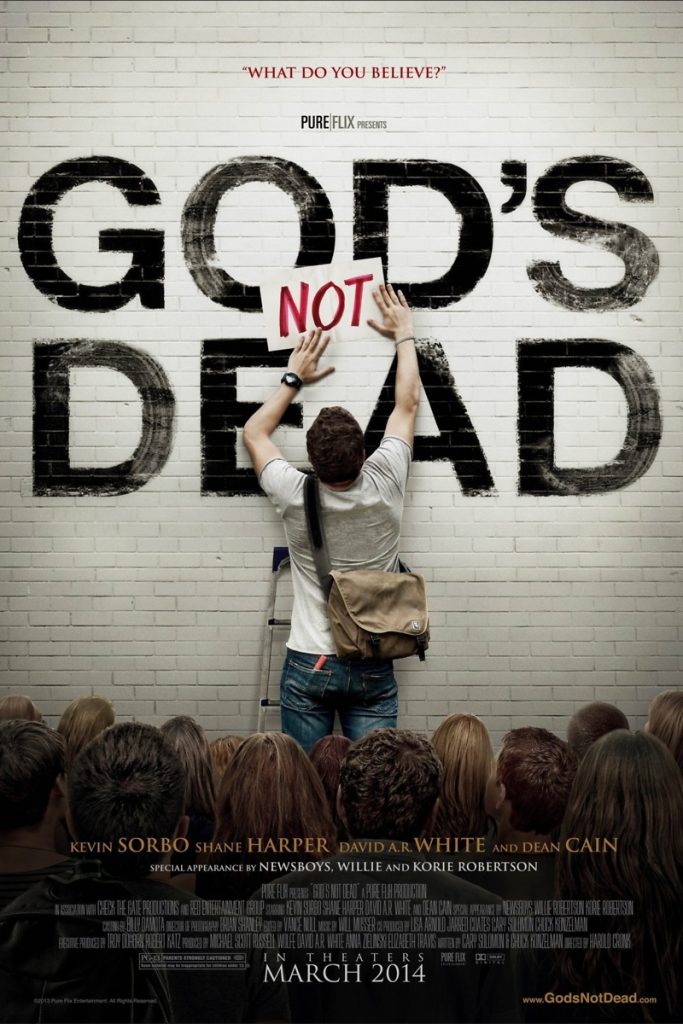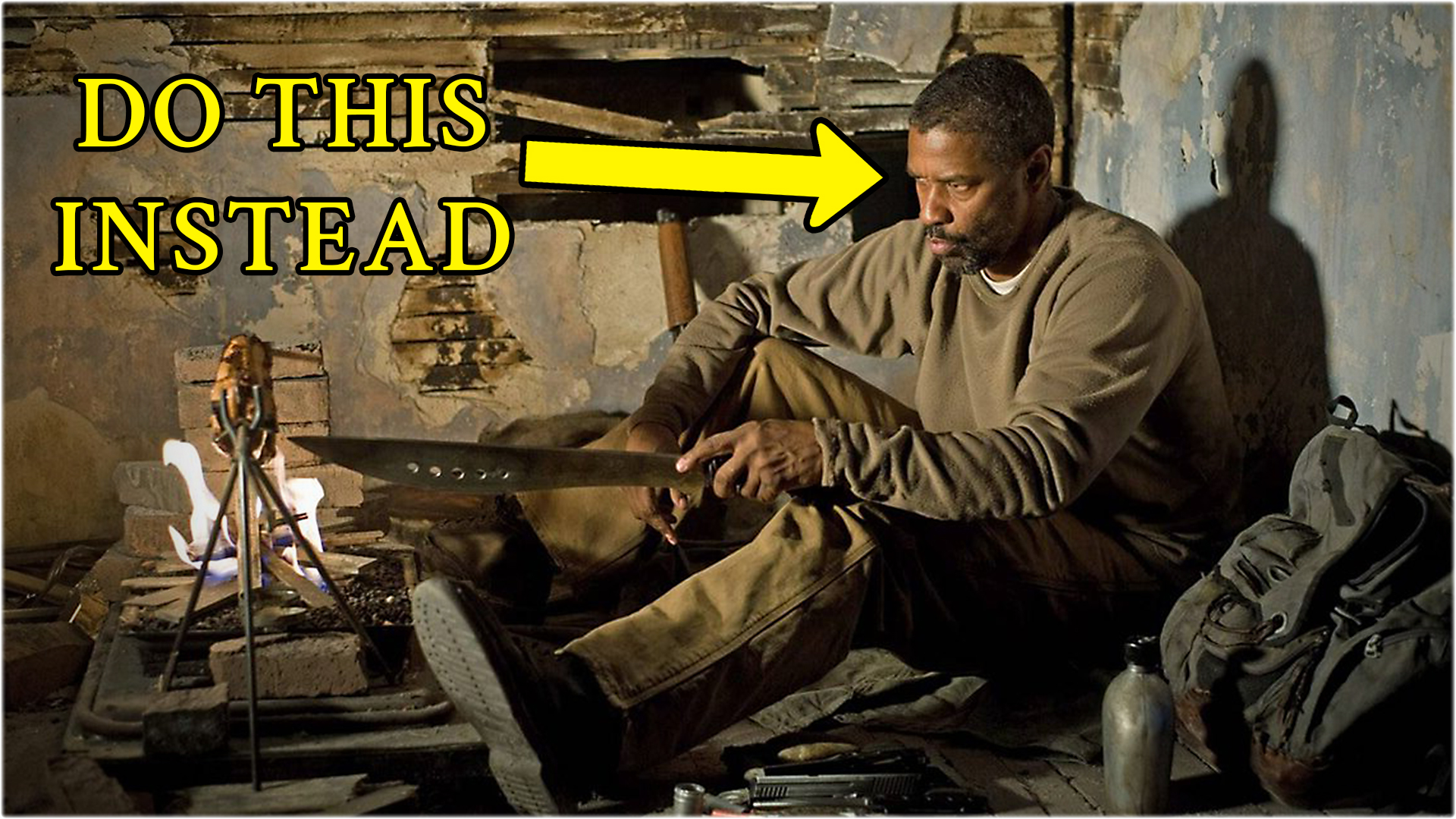Dear Christian Filmmakers: Stop Making Faith-Based Films.
Dear Christian filmmakers: stop making faith-based films.

Dear Christian filmmakers: stop making faith-based films. As conservative Christians, we have a reputation for movies that suck, and the reason is because Christian filmmakers and corporations have been focusing on communicating our faith, not on good storytelling. You may think that’s a good thing, but in a little bit, I will tell you why it’s actually the opposite.
Why do people think Christian movies are bad?
Hello, my friends. Today we are going to be talking about the Christian movie space and why I think Christian filmmakers need to stop making faith-based films. First and foremost, why do people think Christian movies are bad and what is defined as a “faith-based film”? When you say the phrase, “Christian movie”, what’s the first thing most people will think of? Probably corny, cheesy acting, and preachy scripts. These types of movies are most known as “hallmark” movies that are usually targeted at the stereotypical 36-year-old soccer mom (I can’t take credit for this label, I didn’t make it). God’s Not Dead 1 & 2, Miracles from Heaven, and Saving Christmas are a few examples. These movies, while made with good intentions, are, for lack of a better word, uninspiring. When I say “faith-based” films, these are good examples of that phrase. They are what most mainstream Christian films are comprised of today; usually consisting of pointed dialogue and on-the-nose preaching and references. These movies are made with one purpose in mind: targeting a “safe” audience. Now, there is a better way to tell stories, and I will get into it later. Specifically, there is a balancing act regarding character development and worldbuilding that writers have to deal with when coming up with a story, and it’s this issue that Christian movie producers are having problems with.
The movies are not made to reach a broader audience and hook them in with captivating characters; they’re made by executives of companies like PureFlix to target a reliable audience that thrives on movies that are safe; movies that don’t deviate from a predetermined script that they use on all their moves, simply to encourage cashflow. Some of the most inspiring movies and books were made because they didn’t stay in the “safe zone”. But the majority of mainstream Christian movies do not go outside of that box; it’s daunting to deviate from an audience that regularly gives you their money, even if the stories aren’t that good. The movies target a narrow audience, which in and of itself isn’t bad, but the reason faith-based movies are cheesy is because they are required to be that way. It’s not because of a lack of talent, but because the genre has been created to meet certain requirements to pander to a singular, safe audience that does not take chances. These movies keep being made because the producers have a monopoly on the market, so it doesn’t make sense to invest in new markets.
As companies like PureFlix became bigger, there was less risk for people to invest in lower-budget films, and executives started to cater to major markets like Lifeway Christian bookstores and the stereotypical “35-year-old soccer mom”. That’s where you get modern “Christian” films where they are all feminized. So, the propaganda in mainstream Christian movies is over-spiritualized and demasculinized. You will have a hard time finding the everyday working man watching hallmark Christian movies.
Filmmakers who are in unions or have to report to a larger corporation have to meet certain requirements in their films, like having to feature some sort of creature or character format. Hollywood’s latest requirement for their films has been to have a diverse character even if there is no relation to the story whatsoever. Christian movies do something similar: there has to be either a dog, a horse, a little girl, or a serious traumatic emotional event like cancer or breaking up with a romantic partner. The danger in these sorts of movies is a relationship that goes bad. Compare those stakes to those commonly found in sci-fi: death, the destruction of the world, and the possibility of your family and children dying. The stakes are simply higher. That doesn’t mean emotions can’t be a big part of movies, but the issue is when emotions or spirituality is elevated above all the other storytelling elements. It becomes unbalanced.
When filmmakers start out, it’s natural that they would suck, myself as an example. I’m an amateur filmmaker and when I first started, I didn’t know the difference between good editing and bad editing, but after years of practice, I know proper pacing and when to make the right cuts. It’s okay to suck, but the important thing is that you learn to get better, but movies shouldn’t suck on purpose. This doesn’t mean there isn’t any talent and effort put in—although that is certainly the case for some films—it simply means that communicating the message is a higher priority than telling the story, at which point the message would be conveyed naturally anyway.
We as Christians need to be the ones pushing the envelope when it comes to cultural trends, and we need to be doing it in a way that brings glory to God, not encourage mockery and shame. We’re made fun of because we can’t make anything else other than faith-based movies. We need to change that. Yes, part of us being Christians is that we will be mocked because we serve the Creator, not man, but that doesn’t mean we need to make fools of ourselves. We need to change the way we’ve been thinking as Christian creators and as an audience. We serve the master storyteller, and we’re not doing a good job of honouring him by creating movies that inadvertently make us a laughingstock. The problem is that we’ve been focusing on and overemphasizing the spiritual aspects of life, and disregarding the physical, mental, and emotional aspects of the character journey. When these four areas–which are pivotal to any story just like in real life–are left out or neglected, the story becomes lopsided and the character and story arc either becomes fluffy or underperforms.
Relation to anti-Christian worldviews
When a writer sits down at his computer or notepad to draft an idea, his intention will change the end result. Duh, but stay with me, here. If you intend to first, communicate a message or idea, your film will first and foremost be a movie about a message, not a story. Case in point, Disney, Amazon, and Hulu have been narrowing their focus on showing movies that prioritize diversity, and LGBTQ, and showering shame on those who disagree, instead of telling compelling stories that move us. For example: Mulan, The Incredibles, or Lord of the Rings all have a compelling story that drives us to know and understand the characters and follow them on their adventure as they discover truths and change into someone better (or worse) than they were at the beginning.
Streaming platforms are pandering to outraged audiences and executives to check a political box and gain cash instead of creating characters and stories that are rich and full–which by extension will generate more money because it is rich and full. The ironic thing is that companies like Disney have been losing money for being greedy. So, what’s the relation to Christian movies? Why does this matter?
I believe the co-founder and CEO of the streaming platform LOOR said it best: “In some ways, Christian movies are like bad horror films. There’s enough of a market to make them profitable. Nothing wrong with that. The problem is the refusal to reinvest the profits in making something better and expanding the market. Most filmmakers start by making cheap horror films to build a name for themselves. But they don’t stay there. They move on.”
The reason we think of Christian movies as “bad” is because they are made that way on purpose. There’s a sizable market of Christians who readily consume said content, and executives and writers of these films don’t take the risk to make something that may be outside the norm and contrary to their audience and our culture simply for one reason: money. There’s a famous quote from Jesus I want to highlight, “For the love of money is a root of all kinds of evils.” Money in and of itself is not evil, but it is the lust for it, the greed, that leads to evil. The love of money has caught secular and Christian filmmakers in a trap. Stay comfortable and keep making crappy movies that are marketed to a reliable audience, or make a risky move and make a compelling story that might upset a few people because you’re doing stories God’s way. At this point, your faith will naturally be conveyed through the story. People want raw and real stories, not “horse and puppy” movies, not movies that blast a preachy message in your face, not movies where the character takes a five-minute monologue to remind you that “Jesus loves you” and “you just gotta believe, man.” That’s not storytelling. And there are a lot of those kinds of movies out there (speaking from personal experience, I have seen them). There’s also a crossover in this “inspirational” type of messaging with secular films. The main difference is that self-love and empowerment are the answer for the secular man, and for the Christian moviegoer, being a Christian is the main attraction, not the characters and the struggles they go through. A Christian message should naturally be baked into a story as long as the story is the main focus.
Worldviews and common Christian misconceptions of movies
What I mean by this is that when you have a world and life view that lines up with Scripture, you will naturally reflect that in your work and writing without having to go out of your way to do so. To quote myself from a previous commentary: “One of the comments I’ve gotten claimed that Scott Cawthon’s Christian beliefs don’t necessarily translate to his work. Sorry, but you were wrong. A person’s beliefs are naturally embedded into their work, regardless of their intentions. An atheist will write work coming from the perspective that God does not exist, a Christian from the perspective he does indeed exist, and vice versa. You cannot separate one’s beliefs and values from their works, it’s simply a matter of fact. Every single person has a standard for right and wrong(whether it is the correct standard is another question). It’s impossible to live life and not judge actions or situations. You’re making a judgement call, therefore, you are exercising your belief system.”
When you are engaging with the world around you, whether it’s talking to people, watching movies, or writing them, you’re exercising your worldview and all the interactions you experience shape and mould them as you live your life. It’s not a debate as to if a writer’s beliefs translate to their work, but what is being translated to their work. If you’re ingesting and agreeing with entertainment that shows Christians as barbaric and crazy like in the film The Mist based on Stephen King’s novelette, then naturally your worldview will shape itself to fit that belief. There is no such thing as “neutral art”. It doesn’t exist. To claim such a thing would be to claim relativism, and to make truth claims based on relativism is self-refuting. Artists are political by nature. We as Christians especially must uphold the objective standards God has set for us; there is a clear right and wrong, good and evil, blessings for loving him and curses for disobeying him.
You may have heard a word that has gotten a lot of dirt lately. The word I’m talking about is “propaganda”, information that is biased toward a certain idea. When you are listening to a Sunday sermon, you are ingesting propaganda regarding Jesus and his Word. When you are listening to Fox News, you are listening to a certain worldview that the media wants you to hear. Similarly, every film is propaganda for something, the question is, what is it propagandizing? Disney’s main propaganda of late is that “being gay is okay now” and “if you don’t support this ideology then you are a racist, white-supremacist bigot”. The main propaganda of the Bible, if you will, is that we are hopeless, irredeemable sinners in need of a redeemer, Jesus Christ, who pardons the sins of those who believe in him.
Now, obviously, I’ve been giving modern Christian filmmakers a lot of flak, however, there are some positive elements I would like to highlight. An example of a rich and full story would be The Book of Eli, with Denzel Washington as the main character. This movie is a cautionary tale of what happens when we as a culture forsake God in favour of humanistic standards and rules. This film takes place in a post-apocalyptic world run by outlaws, rapists, and crime lords. In this world, we meet a man who is the last of his kind, someone akin to a God-fearing John Wick. God leads this man to bring the last Bible on earth to a place where it can be reprinted and sent out in a world full of godlessness and wicked deeds. Each cast member nailed their role and the story has such a satisfying ending and message, which interestingly, is told secondary to the story as opposed to being at the forefront like most mainstream Christian movies and woke, anti-Christian streaming platforms. We need more movies like this, that have interesting characters, rich worldbuilding, strong casting, and an underlying message that is told through the story, not in spite of it. Luckily, this film is not the only one that does this, so if you want me to do a separate video discussing these wonderful anomalies, comment so I know you’re interested.
Now that we’ve taken the time to address worldviews, I have to bring attention to some common Christian misconceptions when it comes to films. A common attitude of Christians to films is to dismiss it as a kingdom-expanding tool. “It’s just entertainment; we’re not here for our own enjoyment.” Wrong and wrong. Did you know that in the Bible, the dominant means through which God communicates his truth is with visually dramatic stories? Roughly 70% of the Bible is story, vision, symbol and narrative. In case that didn’t sink in, let me clarify: that’s not a small amount. In his parables, Jesus used fictional accounts of characters and situations–stories–to communicate truth to his disciples and us who read his words in Scripture.
If Jesus, the creator of the universe, is using stories to communicate his truth, why shouldn’t we? Films are integrated into our lives, whether we like it or not, and they can be a powerful tool to communicate powerful truths, it’s just that the Christian community, and now much of Hollywood, has been doing it wrong.
Stop making faith-based films
We need to be brave enough to tell stories that go against the proverbial grain, and there needs to be a platform brave enough to allow those stories to be told.
That’s why we need companies like Loor that allow indie creators to come to them with ideas. Not sponsored, by the way. The revolutionary thing about Loor–which other streaming platforms should follow suit with–is that the audience on the platform can vote with their money on which movies and shows they want to see more of. That means, if a certain creator has a crappy idea, they won’t get paid. End of story. When all the money is pooled into one source with streaming services, crappy movies can be made with that vast amount of money instead of funds going to movies that will actually make an impact because there’s a real demand for it.
Don’t be afraid of offending people for the sake of maintaining a good public face. Take myself as an example: the movies and shows I’m writing will certainly offend people. Good. They should offend people because the worldview that God is the creator and the sole being in charge of our lives is not a heart-warming idea. After all, we are all born sinful, selfish, and dirty. Movies and the natural progression of the story arc reflect that. In the beginning, we are dirty and broken, and by the end we have realized our need for help, gone through a character transformation, and are now a different person. The fact that secular writers have to follow inherently Biblical principles is highly ironic to me. It’s simply baked into our nature to want a story to progress a certain way because we are made in the image of God and we want satisfying stories with a strong motive and good resolution.

